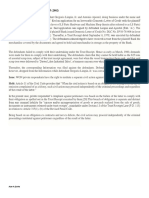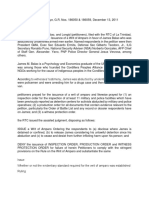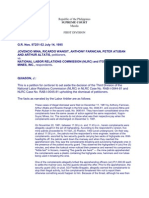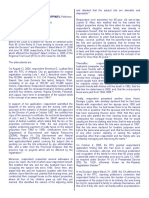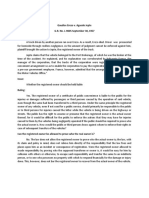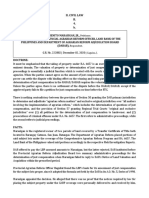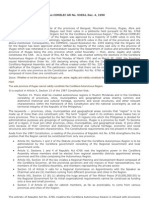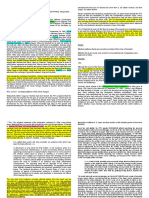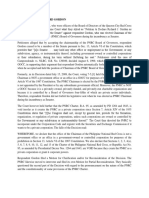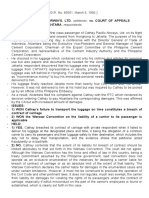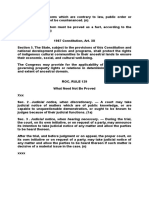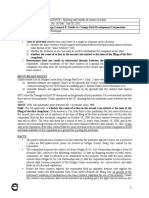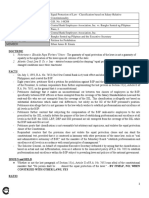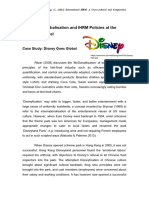0 ratings0% found this document useful (0 votes)
159 viewsMunicipal Corporations Distinguished From Public Corporations
Municipal Corporations Distinguished From Public Corporations
Uploaded by
Antonio Rebosa1. Municipal corporations are public corporations established by state authority to administer local government. They have governmental powers delegated by the state and act with autonomy.
2. Historically, municipal corporations originated from local communities in ancient England and developed similarly in the American colonies and cities in the Philippines under Spanish rule.
3. Under the American regime in the Philippines, the first municipal government law established elected positions for Filipinos, granting suffrage for the first time as part of the transition to autonomy.
Copyright:
© All Rights Reserved
Available Formats
Download as DOCX, PDF, TXT or read online from Scribd
Municipal Corporations Distinguished From Public Corporations
Municipal Corporations Distinguished From Public Corporations
Uploaded by
Antonio Rebosa0 ratings0% found this document useful (0 votes)
159 views9 pages1. Municipal corporations are public corporations established by state authority to administer local government. They have governmental powers delegated by the state and act with autonomy.
2. Historically, municipal corporations originated from local communities in ancient England and developed similarly in the American colonies and cities in the Philippines under Spanish rule.
3. Under the American regime in the Philippines, the first municipal government law established elected positions for Filipinos, granting suffrage for the first time as part of the transition to autonomy.
Original Title
Missing-pages-of-Martin.docx
Copyright
© © All Rights Reserved
Available Formats
DOCX, PDF, TXT or read online from Scribd
Share this document
Did you find this document useful?
Is this content inappropriate?
1. Municipal corporations are public corporations established by state authority to administer local government. They have governmental powers delegated by the state and act with autonomy.
2. Historically, municipal corporations originated from local communities in ancient England and developed similarly in the American colonies and cities in the Philippines under Spanish rule.
3. Under the American regime in the Philippines, the first municipal government law established elected positions for Filipinos, granting suffrage for the first time as part of the transition to autonomy.
Copyright:
© All Rights Reserved
Available Formats
Download as DOCX, PDF, TXT or read online from Scribd
Download as docx, pdf, or txt
0 ratings0% found this document useful (0 votes)
159 views9 pagesMunicipal Corporations Distinguished From Public Corporations
Municipal Corporations Distinguished From Public Corporations
Uploaded by
Antonio Rebosa1. Municipal corporations are public corporations established by state authority to administer local government. They have governmental powers delegated by the state and act with autonomy.
2. Historically, municipal corporations originated from local communities in ancient England and developed similarly in the American colonies and cities in the Philippines under Spanish rule.
3. Under the American regime in the Philippines, the first municipal government law established elected positions for Filipinos, granting suffrage for the first time as part of the transition to autonomy.
Copyright:
© All Rights Reserved
Available Formats
Download as DOCX, PDF, TXT or read online from Scribd
Download as docx, pdf, or txt
You are on page 1of 9
[Continuation of Chapter 2 any particular solicitation, consent or concurrent notion
of the people who inhabit them.
Municipal corporations distinguished from
public corporations. Distinguishing feature of Municipal
It can be said that all municipal corporations are Corporations.
public corporations, but not all public corporations are The distinctive purpose and the distinguishing
municipal corporations. The term “municipal feature of a municipal corporation proper is the power
corporations” properly applies to the incorporated of local government.
villages, towns, and cities, with power of local
administration. Dual nature of Municipal Corporations.
Every municipal corporation has a two-fold
Municipal corporations proper distinguished character – the governmental and the private. In its
from quasi-corporations. public or governmental aspect it acts as an agent of the
While both municipal corporations and quasi- State for the government of the territory and the
corporations are agents of the state for limited and inhabitants within the municipal limits. In its private
narrow purposes, they do not have the powers and aspect, it acts in a similar category as a business
liabilities of self-government unlike municipal corporation, performing functions not strictly
corporations. Municipal corporations proper are called governmental or political. In its governmental
into existence either at the direct solicitation or by the character, it exercise by delegation a part of the
free consent of the persons composing them; while sovereignty of the State. In its private character, it
quasi-corporations, sometimes involuntary stands for the community in the administration of local
corporations, such as counties, et., are only local affairs which is wholly beyond the sphere of the public
organizations which for purposes of civil purposes for which its governmental powers are
administration, are invested with few of the conferred.
characteristics of corporate existence. They are local
subdivisions of the state, created by the sovereign Dual functions of Municipal Corporations.
legislative power of its own sovereign will and without
Municipal corporations perform dual functions. century, has the same corporate character and attributes.
Firstly, they serve as an instrumentality of the State in Cities in Michigan antedated the organization of the
carrying out the functions of the Government. Michigan territorial government.
Secondly, they act as an agency of the community in
the administration of local affairs. It is in the latter In the Philippines under the Spanish Regime.
character that they are acting as separate entities for “The unit of local administration was known as
their own purposes and not as subdivisions of the State. the ‘pueblo’ which ordinarily embraced an area of
many square miles and contained numerous ‘barrios’ or
Origin and history of Municipal villages. For its government, the Spaniards in the
Corporations. beginning continued the title of cabeza de barangay.
In England. Then the towns were organized with a native official
The origin of municipal corporations goes back called the gobernadorcillo (literally “little governor”),
to remote antiquity. Their beginning can be traced to with the popular title of capitan, as the head. He
the ‘farmer commonwealths’ of the early Teutons, and represented the provincial governor as the arbiter of
each ‘wick’, ‘ham’, ‘Stead’, or ‘tun’ took its name from local questions except those assuming a serous legal
the winsmen who dwelt together therein. aspect, was responsible for the collection of taxes, was
bound to assist the parish priest, and entertain all
In the United States. visiting officials. The gobernadorcillo was assisted by
Prior to the Revolution, local governments in the tenientes (deputies), alguaciles (subordinate
the nature of municipalities existed in the American employees), and chiefs of police. Elections for
colonies by prescription or otherwise under sovereign municipal offices were held annually by the outgoing
recognition or under special charters from the gobernadorcillo and twelve cabezas de barangay, the
sovereign. The early American municipalities were parish priest being permitted to be present. Three
formed in the likeness of their British archetype. candidates for the office of the gobernadorcillo were
Generally speaking, the American municipal nominated by plurality of vote and sent to the selected
corporation, although different in many respects from one for the position. Other municipal officers were
its norm, the English municipality of the eighteenth chosen directly by the convention.
“The municipality was divided into barangays “The organization of the City of Manila, and up
(barrios or wards) of about fifty families. For their to the time of the Maura Law, of the other principal
administration there were cabezas de barangay short of cities, such as Iloilo and Cebu, followed quite closely
much of their previous powers whose principal duties that which prevailed in Spanish-American cities, which
were to act as agents for the collection of taxes for the in turn was derived from Spain. Founded in 1871 by
payment of which they were held responsible. They Legaspi as a Spanish City, Manila was speedily given
paid no tribute to their own account and became recognition and named like so many Spanish cities of
members of the prinipalia (principal men), the voting the peninsula ‘Very Loyal and Noble City’. These
and privileged class. Originally hereditary, breaks in corporations had the usual Spanish officials, including
family line were filled by appointments by the Spanish two alcaldes (mayor and vice-mayor) and regidores,
officials; eventually the position because generally (councilors), virtually became self-perpetuating
elective with service compulsory. bodies.”
“Under the Maura Law there was constituted a
municipal council of five, the captain and four Under the American regime.
lieutenants. It was given charge of the active work of The government of municipalities was first
governing municipality, such as administration of provided for in General Order No. 43, series of 1899.
public works, et., and the details of taxation. In This was superseded by General Order No. 40, series of
addition, each of its members was required to have 1900, promulgated by the Military Governor in
special qualifications. These positions were honorary. accordance with the report of the Board headed by
The term of office was composed of al persons who Chief Justice Cayetano Arellano. Part of said report
held certain offices or who paid a land tax of 50 pesos. reads as follows:
The Governor General and the provincial governor
retained disciplinary jurisdiction over the council and “It is with great satisfaction that United
its individual members; the provincial council also had States authorities in consonance with former
supervision over the municipal council. promises, promulgate in this order the law by
which the municipalities or the towns of the careful study of their capacities and observation of the
Philippines are to be established and governed workings of native controls show to be consistent with
in the future. The law inspired by a general the maintenance of law, order, and loyalty. In the
liberal spirit and the principles of autonomous establishment of municipal governments, the
government. It is calculated to urge on the Commission will take as the basis of their work to the
people in the path of true progress, if they are government established by the Military Governor,
desirous to understand their duties as free under the Order of August 8, 1900, to formulate and
citizens and make legitimate use of their report the plan of municipal governor, of which his
privileges. Honor, Cayetano Arellano, President of the Audencia,
“For the first time the Filipino people are was chairman, and consideration which the high
to exercise the right of suffrage in the election of character and distinguished abilities of its members
municipal officers – a right only slightly justified.
restricted by conditions which have been
imposed for the purpose of regarding as well as Accordingly, the Philippine Commission passed
encouraging the people in their just and natural Act No. 82, on January 31, 1901, providing for the
aspiration to become educated, and worthy to organization and government of municipalities, and Act
enjoy all the benefits of civilization.” No. 83, on February 5, 1901, for the organization of
provinces until they were embodied, with
In his instructions to the Second Philippine modifications, in the Administrative Code, as Chapters
Commission on April 7, 1900, President McKinley 56, 57, 64, and 67.
urged and directed the body “to devote their attention in
the first instance to the establishment of municipal
governments in which the natives of the islands, both in
the cities and rural communities, shall be afforded the
opportunity to manage their own local affairs to the
fullest extent of which they re capable, and subject to
the least degree of supervision and control which a
CHAPTER III based on factors relative to visibility and projected
capacity to provide services which can be clearly shown
CREATION OF MUNICIPAL CORPORATIONS by verifiable indicators (Sec. 5, Local Government
Code).
Nature of the power to create Municipal
Corporations. May the power be delegated?
The power to create municipal corporations is In the absence of constitutional provision
essentially legislative. It is exclusive and practically permitting it, the power to create municipal
unlimited. In the absence of any constitutional corporations cannot be delegated by the legislature to
restriction, the legislature may create any kind of any inferior and subordinate tribunal or board.
corporation it deems essential for the more efficient However, it is not an unauthorized delegation of
administration of civil government. (Aside from the legislative power to pass a general law for the
legislature, the President under his Martial law powers incorporation of municipal corporations, giving the
can exercise legislative powers and therefore can create conditions on which they may be created, and
municipal corporations). determining, whether such conditions exist. The
legislature may prescribe a standard for its guidance
Under the New Constitution it is so expressly and empower such agency to determine facts on which
provided that no province, city, municipality, or barrio the operation of a statute providing for the creation of
may be created, divided, merged or abolished, or its such a corporation depends. In some jurisdictions it has
boundary substantially altered, except in accordance been held that the legislature may vest in a court the
with the criteria established in the local government power to determine when the incorporation of a
code, and subject to the approval by a majority of the community is necessary or useful, or to determine the
votes cast in a plebiscite in the unit or units affected. extent and boundary of such municipal corporation, or
even, upon the petition of the inhabitants of a town or
Under the Local Government Code, the creation city, to declare it incorporated. But such is not regarded
of a local government unit or its conversion from one as legislative, as the court has no discretion in the
level into another level of local government shall be matter, and it confers no power, upon the town or city
incorporated, which derives its power from the general
laws. By legislative action under special act – The
legislature may, by special act, organize chartered cities
Conditions precedent to the creation of a in the Philippines, like the City of Manila, City of
Municipal Corporation. Baguio, City of Cebu, Quezon City, etc.
In the creation of a municipal corporation, there
are certain conditions needed in order to obtain its Under the Local Government Code, a Barangay
incorporation as a city or town. Such condition may may be created, named, and its boundaries defined,
refer to the extent of the area proposed to be altered, or modified, by an ordinance of the
incorporated, the nature of the territory, the character of Sangguniang Panlalawigan or Sangguinuang
the land and the uses to which it may be devoted, the Panlungsod, as the case may be, subject to the approval
number of inhabitants and even the density and location by a majority of the votes cast in a plebiscite called for
of the area to be incorporated. the purpose by the Commission on Elections to be held
in the unit or units affected within such period of time
Creation of Municipal Corporations. as may be determined by the ordinance creating the said
The power to create corporations including Barangay.
municipal corporations, resides in the Batasang
Pambansa which under the Constitution is given Can the President under Section 68 of the
general legislative powers. Revised Administrative Code, create municipal
corporation?
In the Philippines these is general municipal law Under Section 68 of the Revised Administrative
(Chapter 57 of the Administrative Code) under which Code the President may, by executive order, define the
the municipalities in regularly organized provinces boundary or boundaries, of any province, sub-province,
were organized; and a special municipal law, (Chapter municipality (township) or other political subdivision,
64 of the Administrative Code) under which the and increase or diminish the territory comprised therein,
municipalities in the special organized provinces were may divide any province into one or more sub-
organized. provinces, separate any political division other than a
province into such portion as may be required, merge regard to the particular subject matter with which it
any of such subdivisions or portions with another, name authorizes the Governor-General to deal. It was simply
any new subdivision so created, and may change the a transference of certain details with respect to
seat of government within any sub-division, to such provinces, municipalities and townships, many of them
place therein as the public welfare may require: newly created, and all of them subject to more or less
Provided, That the authorization of the Congress of the rapid change both in development and center of
Philippines shall first be obtained whenever the population, the proper regulation of which may require
boundary of any province or sub-province is to be not only prompt action of such detailed character as not
defined or any province is to be divided into one or to permit the legislative body, as such, to take it
more sub-provinces. When any action by the President efficiently.
of the Philippines in accordance herewith makes
necessary a change of the territory under the However, in the case of Pelaez v. Gimenez, G.R.
jurisdiction of any administrative officer or any judicial No. L-23825, December, 1965, the Supreme Court held
officer, the President of the Philippines, with the that Sec. 68 of the Revised Administrative Code does
recommendation and advice of the head of the not meet the well-settled requirements for a valid
Department having executive control of such officer, delegation of the power to fix the details in the
shall redistrict the territory to new districts so formed enforcement of a law. It does not enunciate any policy
(Sec. 68, Revised Administrative Code). to be carried out or implemented by the President.
Neither does it give a standard sufficiently precise to
In the case of Municipality of Cardona v. avoid the evil effects above referred to. It is true that,
Binangonan, 36 Phil. 547, wherein the same objection under the last clause of the first sentence of Sec. 68, the
was made against Section 1 o Act. No. 1748 which President “may change the seat of the government
conferred upon the then Governor-General the power to within any subdivision to such place as the public
enlarge, constrict, or otherwise change the boundary of welfare may require.” It is apparent, however, that the
a province, sub-province, municipality or township, the phrase “as the public welfare may require” qualifies,
Supreme Court held that there was no abdication of not the clauses preceding the one just quoted but only
legislative functions on the part of the legislature with
the place to which the seat of government may be
transferred. It is true that Sec. 10(a) of Article 10 of the
Constitution ordains that the President shall have
At any rate, the conclusion would be the same control of all the executive departments, bureaus, or
insofar as the case at bar is concerned, even if the offices, and exercise general supervision over all local
phrase “as public welfare may require” in said Sec. 68 governments as may be provided by law. The power of
qualifies all other clauses thereof. It is true that in control under this provision implies that the right of the
Calalang v. Williams, 70 Phil. 726 and People v. President to interfere in the exercise of such discretion
Rosenthal, 68 Phil. 328, this Court has upheld public as may be vested by law in the officers of the executive
welfare and interest as sufficient standards for a valid departments, bureaus, or offices, as well as to act in lieu
delegation of authority to execute the law. But the of such officers. This power is denied by the
doctrine laid down in those cases – as all judicial Constitution to the executive, insofar as local
pronouncements – must be construed in relation to the governments are concerned. With respect to the latter,
specific facts and issues involved therein outside of the fundamental law permits him to wield no more
which they do not constitute precedents and have no authority than that of checking whether said local
binding effect. governments or the officers thereof perform their duties
as provided by statute. Hence, the President cannot
If the validity of the delegation of power made interfere with local governments, so long as the same or
in Sec. 68 were upheld, there would be no longer any their officers act within the scope of their authority.
legal impediment to a statutory grant of authority to the
President to do anything which, in his opinion, may be If the President could create a municipality, he
required by public welfare or public interest. Such grant could, in effect, remove any of its officials, by creating
of authority would virtually be an abdication of the new municipality and including herein the barrio in
power of Congress in favor of the Executive, and would which the official concerned resides, for his office
bring about a total collapse of the democratic system would thereby become vacant. Thus, by merely
established by the Constitution, which is the special brandishing the power to create a new municipality (if
duty and privilege of this Court to uphold. he had it), without actually creating it, he could compel
local officials to submit to his dictation, thereby, in recommendation of the council of the municipality in
effect exercising over them the power of control denied which the proposed barrio is situated.
to him by the Constitution.
Case: During the period from Sept. 4 to Oct. 29,
1964, the president of the Philippines, purporting to act
pursuant to Sec. 68 of the Revised Administrative
Code, issued Executive Orders Nos. 93 to 121, 124, and
126 to 129, creating 33 municipalities. Soon after the
date last mentioned, or on November 10, 1964,
petitioner Pelaez, as Vice President of the Philippines
and as taxpayer, instituted the present special civil
action for a writ of prohibition with preliminary
injunction against the Auditor General, to restrain him,
as well as his representatives and agents from passing in
audit any expenditure of public funds in implementation
of said executive orders and/or any disbursement by
said municipalities. Petitioner alleges that said
executive orders are null and void upon the ground that
said Sec. 68 has already been repealed by Republic Act
No. 2370. Held: Under Section 3 of the Republic Act
No. 2370, which took effect on January 1, 1960, barrios
may not be created nor their boundaries nor their names
changed, except by Act of Congress or of the
corresponding provincial boards upon petition of a
majority of the voters in the areas affected and the
You might also like
- List of Documents IATF 16949 2016 Documentation Toolkit enDocument4 pagesList of Documents IATF 16949 2016 Documentation Toolkit enOscar Solis MartirNo ratings yet
- Genuino v. de LimaDocument3 pagesGenuino v. de LimaAntonio Rebosa100% (4)
- US vs. Toribio PDFDocument3 pagesUS vs. Toribio PDFAntonio RebosaNo ratings yet
- Churchill v. Rafferty PDFDocument3 pagesChurchill v. Rafferty PDFAntonio Rebosa0% (1)
- Apostasy in The Legal ProfessionDocument4 pagesApostasy in The Legal Professionjojit s antimanoNo ratings yet
- Checklist of Documentation For IATF 16949 - 2016Document11 pagesChecklist of Documentation For IATF 16949 - 2016Deepak kumar100% (2)
- JOSE MA. T. GARCIA, Petitioner, v. COURT OF APPEALSDocument1 pageJOSE MA. T. GARCIA, Petitioner, v. COURT OF APPEALSmark anthony mansuetoNo ratings yet
- 193 Sarmiento Vs CA, 394 SCRA 315 (2002)Document1 page193 Sarmiento Vs CA, 394 SCRA 315 (2002)Alan GultiaNo ratings yet
- Lilius V Manila RailroadDocument3 pagesLilius V Manila RailroadTon Rivera100% (1)
- Capitol Wireless, Inc. vs. The Provincial Treasurer of Batangas, Et AlDocument21 pagesCapitol Wireless, Inc. vs. The Provincial Treasurer of Batangas, Et AlGfor FirefoxonlyNo ratings yet
- Allado vs. DioknoDocument8 pagesAllado vs. DioknoNoo NooooNo ratings yet
- Bill of Rights Digest Part 2Document34 pagesBill of Rights Digest Part 2Mark DungoNo ratings yet
- Balao v. Macapagal-Arroyo, G.R. Nos. 186050 & 186059, December 13, 2011 PDFDocument4 pagesBalao v. Macapagal-Arroyo, G.R. Nos. 186050 & 186059, December 13, 2011 PDFMark Joseph CruzNo ratings yet
- Manila Steamship Co v. InsaDocument2 pagesManila Steamship Co v. InsaJogie AradaNo ratings yet
- 21-Taule Vs Santos 200 SCRA 512Document10 pages21-Taule Vs Santos 200 SCRA 512enan_intonNo ratings yet
- 3 Term LimitDocument12 pages3 Term LimitLex Lim0% (1)
- Mercado v. Dysangco PDFDocument7 pagesMercado v. Dysangco PDFMarion Yves MosonesNo ratings yet
- 32 Timbol VS CanoDocument4 pages32 Timbol VS CanoKeej DalonosNo ratings yet
- Republic v. Peralta GR No. 221029Document2 pagesRepublic v. Peralta GR No. 221029Rachell RoxasNo ratings yet
- OFFICE OF THE COURT ADMINISTRATOR v. RODELIO E. MARCELO and MA. CORAZON D. ESPAÑOLADocument1 pageOFFICE OF THE COURT ADMINISTRATOR v. RODELIO E. MARCELO and MA. CORAZON D. ESPAÑOLAm_oailNo ratings yet
- Assignment No 7.1Document37 pagesAssignment No 7.1rollanekimNo ratings yet
- 01 GR 154521Document2 pages01 GR 154521Mabelle ArellanoNo ratings yet
- GR 176657 Dfa Vs FalconDocument18 pagesGR 176657 Dfa Vs FalconCesar CoNo ratings yet
- PDP-LABAN v. Commission On Elections, G.R. No. 225152 (2021) (J. Leonen, Separate Concurring)Document13 pagesPDP-LABAN v. Commission On Elections, G.R. No. 225152 (2021) (J. Leonen, Separate Concurring)Ferdie OquendoNo ratings yet
- VDA. DE ESCONDE v. CADocument2 pagesVDA. DE ESCONDE v. CAKingNo ratings yet
- Leon G. Maquera in His Own Behalf As Petitioner. Ramon Barrios For RespondentsDocument5 pagesLeon G. Maquera in His Own Behalf As Petitioner. Ramon Barrios For RespondentsMarjorie C. Sabijon-VillarinoNo ratings yet
- BOHOL vs. CA: Petitioner: Respondent: DATE: December 28, 1995 PONENTE: Decembeer 28, 1995, JDocument2 pagesBOHOL vs. CA: Petitioner: Respondent: DATE: December 28, 1995 PONENTE: Decembeer 28, 1995, JLance MorilloNo ratings yet
- Plbe2018 6-10Document6 pagesPlbe2018 6-10Jessica VargasNo ratings yet
- Sycamore Venture vs. Metrobank, 2013 - PQ To Suspension Foreclosure ProceedingsDocument11 pagesSycamore Venture vs. Metrobank, 2013 - PQ To Suspension Foreclosure ProceedingshenzencameroNo ratings yet
- Ramos and Eliadora Ramos, Petitioners, vs. Raul Obispo and Far East Bank and Trust Company, Respondents. Villarama, JDocument2 pagesRamos and Eliadora Ramos, Petitioners, vs. Raul Obispo and Far East Bank and Trust Company, Respondents. Villarama, JNadine Reyna CantosNo ratings yet
- Mina vs. NLRCDocument4 pagesMina vs. NLRCRamon Augusto Melad LacambraNo ratings yet
- How Is The Resolution PreparedDocument1 pageHow Is The Resolution PreparedFran JaramillaNo ratings yet
- RP vs. LualhatiDocument4 pagesRP vs. LualhatijiggerNo ratings yet
- Noble v. Abaja: G.R. No. 147145, 31 January 2005, 450 SCRA 265 FactsDocument2 pagesNoble v. Abaja: G.R. No. 147145, 31 January 2005, 450 SCRA 265 FactsBALA CHRISTINA JESSANo ratings yet
- Gaudioso Ereso v. JepteDocument2 pagesGaudioso Ereso v. JepteJerahmeel CuevasNo ratings yet
- G.R. No. 222882Document3 pagesG.R. No. 222882Anton Palpal-latocNo ratings yet
- Kiobel Vs Royal Dutch PetroleumDocument22 pagesKiobel Vs Royal Dutch PetroleumXing Keet LuNo ratings yet
- Miranda v. Aguirre Full CaseDocument11 pagesMiranda v. Aguirre Full CaseJaia Nicole Guevara TimoteoNo ratings yet
- Legislative - and Ladlad Vs COMELECDocument3 pagesLegislative - and Ladlad Vs COMELECNathalie Faye Abad ViloriaNo ratings yet
- Codilla Vs MartinezDocument2 pagesCodilla Vs MartinezJessamine OrioqueNo ratings yet
- Flores vs. ChuaDocument13 pagesFlores vs. ChuaXryn MortelNo ratings yet
- 20 El Oriente, Fabrica de Tabacos, Inc., vs. Posadas 56 Phil. 147, September 21, 1931Document7 pages20 El Oriente, Fabrica de Tabacos, Inc., vs. Posadas 56 Phil. 147, September 21, 1931joyeduardoNo ratings yet
- Republic of Thephilippines v. Dela Rosa 1994 (TORRES)Document2 pagesRepublic of Thephilippines v. Dela Rosa 1994 (TORRES)Bea TorresNo ratings yet
- Matrido V PeopleDocument1 pageMatrido V PeoplePrin OinezaNo ratings yet
- Cordillera Regional Assembly Vs COMELEC GR NoDocument1 pageCordillera Regional Assembly Vs COMELEC GR Noangelhugs_09No ratings yet
- Republic v. Marcos Sandiganbayan Civil Case No 0141 (No Footnotes)Document28 pagesRepublic v. Marcos Sandiganbayan Civil Case No 0141 (No Footnotes)Fortunato MadambaNo ratings yet
- Araujo vs. CelisDocument5 pagesAraujo vs. CelisRaquel DoqueniaNo ratings yet
- Whether The Lower Courts Were Correct in Not Considering The Extrajudicial Sworn Statement of Villa.Document3 pagesWhether The Lower Courts Were Correct in Not Considering The Extrajudicial Sworn Statement of Villa.Mitch BarandonNo ratings yet
- Fernando Vs CrisostomoDocument5 pagesFernando Vs CrisostomoNoelle Therese Gotidoc VedadNo ratings yet
- UntitledDocument78 pagesUntitledCinja ShidoujiNo ratings yet
- Petitioners vs. VS.: en BancDocument6 pagesPetitioners vs. VS.: en BancJian CerreroNo ratings yet
- DANTE LIBAN vs. RICHARD GORDONDocument3 pagesDANTE LIBAN vs. RICHARD GORDONIyahNo ratings yet
- 1) Identify The Legal IssueDocument6 pages1) Identify The Legal IssueKryscel CzarinahNo ratings yet
- Cruz Vs People Attempted RapeDocument10 pagesCruz Vs People Attempted RapeAna RogersNo ratings yet
- Case 18 Ace Bus Transportation Vs South Hudson Country Blood Bus OwnerDocument1 pageCase 18 Ace Bus Transportation Vs South Hudson Country Blood Bus Ownerraikha barraNo ratings yet
- Cathay Pacific vs. CADocument1 pageCathay Pacific vs. CAMareca DomingoNo ratings yet
- (Memoracion) Cases 112-114Document6 pages(Memoracion) Cases 112-114Michael Angelo MemoracionNo ratings yet
- Presumption and Applicability of CustomDocument7 pagesPresumption and Applicability of CustommrrrkkkNo ratings yet
- DIGEST Rule 1 No. 8 and Rule 2 No. 2 Republic of The Philippines v. Hon. Jose R. HernandezDocument3 pagesDIGEST Rule 1 No. 8 and Rule 2 No. 2 Republic of The Philippines v. Hon. Jose R. HernandezRomnick JesalvaNo ratings yet
- Trillanes v. Castillo-Marigomen, G.R. No. 223451, Mar 14, 2018. Full TextDocument14 pagesTrillanes v. Castillo-Marigomen, G.R. No. 223451, Mar 14, 2018. Full TextRyuzaki HidekiNo ratings yet
- RP Vs CA and GacotDocument1 pageRP Vs CA and GacotWonder WomanNo ratings yet
- PAL v. Savillo DigestDocument1 pagePAL v. Savillo DigestOne TwoNo ratings yet
- Poli LawDocument4 pagesPoli LawArnette A. LaraNo ratings yet
- Case 17 - Republic Vs Edilberto Sandoval, 220 Scra 124Document2 pagesCase 17 - Republic Vs Edilberto Sandoval, 220 Scra 124Aquiline ReedNo ratings yet
- Missing Pages of MartinDocument9 pagesMissing Pages of MartinStephanie SerapioNo ratings yet
- Rufino v. Endriga PDFDocument2 pagesRufino v. Endriga PDFAntonio RebosaNo ratings yet
- Nasiad V CTADocument2 pagesNasiad V CTAAntonio RebosaNo ratings yet
- Manotoc Jr. v. CADocument2 pagesManotoc Jr. v. CAAntonio RebosaNo ratings yet
- Cuadra v. CordovaDocument1 pageCuadra v. CordovaAntonio Rebosa100% (1)
- Ambas v. BuenasedaDocument2 pagesAmbas v. BuenasedaAntonio Rebosa100% (1)
- Uniwide Holdings Inc. V CruzDocument2 pagesUniwide Holdings Inc. V CruzAntonio RebosaNo ratings yet
- Umale V CPDCDocument3 pagesUmale V CPDCAntonio RebosaNo ratings yet
- Duque v. SantiagoDocument2 pagesDuque v. SantiagoAntonio RebosaNo ratings yet
- Tolentino V PaqueoDocument3 pagesTolentino V PaqueoAntonio RebosaNo ratings yet
- Sps. Decena v. Sps. PiqueroDocument3 pagesSps. Decena v. Sps. PiqueroAntonio RebosaNo ratings yet
- Tokio Marine V Jorge ValdezDocument3 pagesTokio Marine V Jorge ValdezAntonio RebosaNo ratings yet
- Home Insurance V Eastern Shipping LinesDocument5 pagesHome Insurance V Eastern Shipping LinesAntonio RebosaNo ratings yet
- China Banking Corp V CADocument2 pagesChina Banking Corp V CAAntonio Rebosa50% (2)
- Balais-Mabanag v. Registry of Deeds of QCDocument2 pagesBalais-Mabanag v. Registry of Deeds of QCAntonio Rebosa100% (2)
- TAX Determination of Gain or Loss From Sale or ExchangeDocument14 pagesTAX Determination of Gain or Loss From Sale or ExchangeAntonio RebosaNo ratings yet
- Aure V AquinoDocument3 pagesAure V AquinoAntonio RebosaNo ratings yet
- Gaza v. LimDocument3 pagesGaza v. LimAntonio RebosaNo ratings yet
- Agbayani v. BelenDocument3 pagesAgbayani v. BelenAntonio Rebosa100% (1)
- Blardony v. CoscolluelaDocument2 pagesBlardony v. CoscolluelaAntonio RebosaNo ratings yet
- Villagracia v. 5th Sharia Disctrict CourtDocument3 pagesVillagracia v. 5th Sharia Disctrict CourtAntonio RebosaNo ratings yet
- Wee v. de Castro PDFDocument3 pagesWee v. de Castro PDFAntonio RebosaNo ratings yet
- People V Fajardo PDFDocument1 pagePeople V Fajardo PDFAntonio RebosaNo ratings yet
- American Inter Fashion v. OP PDFDocument2 pagesAmerican Inter Fashion v. OP PDFAntonio RebosaNo ratings yet
- Central Bank Employees Association, Inc. vs. Bangko Sentral NG Pilipinas PDFDocument3 pagesCentral Bank Employees Association, Inc. vs. Bangko Sentral NG Pilipinas PDFAntonio RebosaNo ratings yet
- Churchill v. Rafferty PDFDocument3 pagesChurchill v. Rafferty PDFAntonio RebosaNo ratings yet
- American Inter Fashion v. OP PDFDocument2 pagesAmerican Inter Fashion v. OP PDFAntonio RebosaNo ratings yet
- US vs. Toribio PDFDocument3 pagesUS vs. Toribio PDFAntonio RebosaNo ratings yet
- Business Profile of MR Vimal BabuDocument7 pagesBusiness Profile of MR Vimal BabumissjethmalaniNo ratings yet
- Essay 550 WordsDocument2 pagesEssay 550 Wordsapi-477119872No ratings yet
- Alpha College Canada Assignment HelpDocument9 pagesAlpha College Canada Assignment HelpAlpha College Assignment HelpNo ratings yet
- CV - Edwin Flores - ENDocument3 pagesCV - Edwin Flores - ENOscar Sakay GamarraNo ratings yet
- 4 Political Frame WorksheetDocument4 pages4 Political Frame Worksheetapi-672130678No ratings yet
- BUSI1.008 - Cross Cultural Awareness in International Business MeetingsDocument3 pagesBUSI1.008 - Cross Cultural Awareness in International Business MeetingsKenny Graham100% (1)
- Disneyfication Case Study W3Document2 pagesDisneyfication Case Study W3javenxxx01No ratings yet
- Masculine Ideal in The Old Man and The SeaDocument5 pagesMasculine Ideal in The Old Man and The Seaapi-295869808100% (1)
- Mahaveer Security Guard ServicesDocument3 pagesMahaveer Security Guard ServicesavnishNo ratings yet
- 2019 10 OKANE ETAL Potential Improvements Stockpile Construction MethodsDocument46 pages2019 10 OKANE ETAL Potential Improvements Stockpile Construction MethodsMudabbirNo ratings yet
- Assume The Following Cost Data Are For A Purely Competitive ProducerDocument1 pageAssume The Following Cost Data Are For A Purely Competitive Producertrilocksp SinghNo ratings yet
- SQTE000017 - Enova Riyadh Quotation - PK-01-Emergency LightDocument1 pageSQTE000017 - Enova Riyadh Quotation - PK-01-Emergency Lightmyahya685No ratings yet
- Human Settlements CUET Geography CH 10 - 240722 - 232337Document16 pagesHuman Settlements CUET Geography CH 10 - 240722 - 232337Aayush PatelNo ratings yet
- Annexures & ProformaeDocument4 pagesAnnexures & ProformaeSanjeet SoniNo ratings yet
- Deposit Provisions Under The Companies Act, 2013 - TaxGuruDocument12 pagesDeposit Provisions Under The Companies Act, 2013 - TaxGuruRoopam singhNo ratings yet
- Sample Tax Declaration Form Philippines - Google SearchDocument1 pageSample Tax Declaration Form Philippines - Google Searchcristina maguicayNo ratings yet
- CarreraSalazar Silvia M06S2AI4Document3 pagesCarreraSalazar Silvia M06S2AI4kitty76% (49)
- The Impact of Exchange Rate On Indian Stock Exchanges Like BSE & NSEDocument2 pagesThe Impact of Exchange Rate On Indian Stock Exchanges Like BSE & NSEhhhhhhhNo ratings yet
- Living Rosary 2022Document17 pagesLiving Rosary 2022AhnNo ratings yet
- The Bicycle EssayDocument5 pagesThe Bicycle EssayKristen Pyke33% (3)
- Can't StopDocument3 pagesCan't Stopsarah.colineNo ratings yet
- Monthly Summary of Articles On Food Fraud and Adulteration: January 2020Document2 pagesMonthly Summary of Articles On Food Fraud and Adulteration: January 2020Миша Макух0% (1)
- PRINCIPLES OF AUDITING Bharathiar University III B COM PADocument59 pagesPRINCIPLES OF AUDITING Bharathiar University III B COM PAkalpana100% (1)
- Internship Report EnglishDocument67 pagesInternship Report EnglishHind Azarkan0% (1)
- Titis Basino Was Born in MagelangDocument9 pagesTitis Basino Was Born in MagelangLIMfelixNo ratings yet
- Arata IsozakiDocument6 pagesArata IsozakiaryaNo ratings yet
- 2008 Form 990 Carpenter Charity FundDocument30 pages2008 Form 990 Carpenter Charity FundLatisha WalkerNo ratings yet
- Bài 1: Chia động từ trong ngoặc ở thì HTHTDocument8 pagesBài 1: Chia động từ trong ngoặc ở thì HTHTPhong ĐặngNo ratings yet







